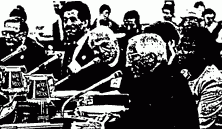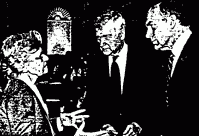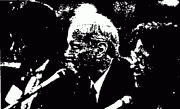
Number 2 Summer 1992
A Witness for Conscience:
After 20 Years Peace Tax Bill Gets a Hearing
by Vinton Deming and Melissa Kay Elliott
If we give the right to a person to withhold their body from a war as a conscientious objector, that person should be able to withhold his [or her] money as well.
So spoke Senator Mark Hatfield in his leadoff testimony in Washington, DC, on May 21 before the House Ways and Means Committee Subcommittee on Select Revenue Measures hearing on H.R. 1870, the US Peace Tax Fund Bill.
Hatfield's words set an important theme that recurred throughout the hearing: the need to respect the rights of individual conscience.
The occasion was an historic one. This was the first actual hearing held since a Peace Tax Fund Bill was first introduced in Congress 20 years ago. And the moment was not to be lost. Several hundred spectators from across the country packed the hearing room. Many attended as concerned individual taxpayers. Others came as members of religious denominations and peace groups long associated with the Peace Tax Fund Campaign. Three chartered buses, one from Lancaster, Pennsylvania, and two others from Philadelphia, swelled the numbers by some 150 supporters. When the last of them filed in from a late arriving bus to find all spectator seats occupied, Chairman Charles Rangel stopped the hearings momentarily, inviting standing-room-only observers to move forward and to occupy empty seats normally reserved for officials and the press. Veterans of peace demonstrations, several parents holding small children, young bearded men in simple dress, and older couples from the peace churches created a colorful patchwork as they mixed with Congressional aides, heads of foundations, and capitol bureaucrats in business suits.
In addition to the many who attended the hearing, many others were present in spirit. More than 2,500 letters in support of the Peace Tax Fund Bill had been bound in large volumes and set on a front table to be presented to the committee. Between 50 and 100 such letters continued to arrive daily during the week of the hearing.
Following the introductory testimony of Mark Hatfield, lead sponsor of the Bill (S.689) in the Senate, there were also presentations by three other members of Congress: Andy Jacobs (lead sponsor of the Bill in the House), Nancy Pelosi, and John Conyers. Representative Jacobs, besides testifying, sat with Charles Rangel during the hearing, flanked by a number of key staff members of other representatives.
In addition to Congressional testimony, a panel of religious leaders testified. One, Thomas Gumbleton, Roman Catholic bishop from Detroit, and past president of Pax Christi, pointed out that two of the first leaders of the church, John and Peter, said that sometimes it is necessary to obey God before obeying the law. How much better it would be, Gumbleton said, for COs to be able to pay all their taxes, knowing their money would be used for life-affirming purposes.
William Davidson, retired Episcopal bishop of western Kansas, a CO in World War II, has actively opposed war since 1939. Having lived past draft age, I have been saddened and conflicted each year having to pay taxes to support war,
he said. Long active with Episcopal Peace Fellowship, he pointed out that EPF has consistently supported war tax resistance as a religious witness for peace.
John A. Lapp, executive secretary of Mennonite Central Committee, Akron, Pennsylvania, spoke on behalf of the three historic peace churches (Mennonites, Quakers, and Church of the Brethren). He turned and noted the large attendance of peace church members at the hearings. The issue of war-resisted taxes is one of religious freedom Lapp said, Many of us feel the pain of having our religious institutions serve as tax collectors for war.
Each of the church groups he represents, he continued, has a long history of opposing involvement in war: Mennonites since the 16th Century, Friends since the 17th, and Brethren since the 18th. The 1990s provide a special moment. Lapp concluded, for Congress to reduce the size of the nation's military and to support religious freedom. Passage of the Peace Tax Fund Bill could help to focus these concerns.
Rabbi Phil Bentley, from Santa Fe, New Mexico, president of the Jewish Peace Fellowship (JPF), said part of the Jewish tradition is to create community, take care of the sick and poor. For over 50 years, he said, the JPF has supported Jewish pacifists.
During committee questioning, Representative Jacobs asked Rabbi Bentley, Is [passage of this bill] going to give rise to requests for similar legislation from people who don't want their money going for a golf course?
This is not a political issue, but a moral issue of conscience,
responded Bentley, and he thanked the committee for carefully examining this legislation.
Jacobs, in response, thanked the Rabbi and others of religious conscience who had testified. I am a sponsor of this bill,
he said, but I am not a pacifist.
He called to mind one of his favorite movies, Friendly Persuasion, and the lines spoken toward the end of the film: It's good to know that somebody is holding out for a better way of settling things!
Statements of support from several other religious bodies were presented in written form only because of the strict limitation on time. Jaydee Hanson, assistant general secretary of the General Board of Church and Society of the United Methodist Church, noted that church's support for conscientious objectors to paying military taxes and reported that the United Methodists' 1992 General Conference had just declared militarism a common enemy to all humanity.
Rev. Elenora Giddings Ivory, director of the Washington Office of the Presbyterian Church ( USA) representing her denomination, submitted a written statement quoting from the Presbyterian 1988 General Assembly that went beyond mere support for the Bill, urging that the proposal be amended to include those who object to ‘war taxes’ on ‘just war’ grounds as well as those who are conscientious objectors to all war.
Chaplain (Major) Nelson Stone, US Army Reserve, who, like Jacobs, is not a pacifist, submitted testimony praising conscientious objectors' contribution to strengthening American society.
During the Gulf War I was deployed with my unit to a hospital in the United Arab Emirates. There I came to have an understanding of what can happen to a culture that does not deal well with diversity…When we allow diversity to flourish we allow individuals to retain and exercise personal integrity. This enhances self-esteem, which makes for greater involvement in the life of the nation.
Not all testimony during the day was as supportive of the Bill. Terrill Hyde, tax legislative counsel for the Department of the Treasury, presented the Bush Administration position opposing the PTF. She mentioned problems of complexity, confusion, and increased administrative burden,
sure to arise if the Bill were passed. There would be no deterrent either, she said, to restrain taxpayers from inappropriately claiming CO status. If taxpayers were allowed to designate the uses for which their tax dollars were spent, our entire budgetary process would be undermined.
There would likely be loss of revenue to needed federal programs.
Others, however, presented differing views. Several speakers argued that there would likely be substantial increases in revenue as a direct result of the Bill's passage. Many who currently refuse to pay a portion or all of their taxes would gladly pay. Also, large costs resulting from the efforts to collect from tax resisters would be avoided. Answering the criticism of how the act might increase paperwork and administrative costs, several people testified to the simple nature of the Bill and of the tax-filing process.
As to IRS claims that the Bill raises possible legal questions, a panel of two legal specialists responded. Mark Tushnet, professor of law at Georgetown University, said, A nation that wants to protect the religious freedom of its citizens can reasonably be expected to enact legislation to enable the freedom to be expressed.
It seems perfectly appropriate, he concluded, that such legislation be enacted. It is needed in addition to the Religious Freedom Act.
Philadelphia, Pennsylvania, attorney and war tax specialist Peter Goldberger agreed. Legislation of this kind has a noble history in our country,
and he quoted from a 1790 letter from then President George Washington to Philadelphia Quakers. The nation's laws
, Washington wrote, must always be ‘extensively accommodated’ in cases of individual conscience.
In response to criticism that the Bill might be a drain on the defense budget, Goldberger said, this is not an attempt to manipulate the military budget on political grounds. If this Peace Tax Fund Act actually made the military budget come up short, we pacifists would have a completely different political power in this country.
Alan Eccleston, an organizational development consultant from Hadley, Massachusetts, said,
I want to tell you about my own spiritual beliefs as a member of the Religious Society of Friends (Quakers), and how I am burdened by having to endure penalties, punishments, and the threat of confiscation of my home in order to be true to my conscience and to practice the faith of my Quaker forebears. ...The IRS has put a lien on my house three times. They have a lien on it at this very moment Automobiles have been taken from friends of mine and auctioned. Most recently in Colrain, Massachusetts, houses of two different families have been taken by the IRS.... Conscience must be taken into account. Spiritual values are real. They are not to be treated as incidental or expendable to fit the needs of the state. This is what the First Amendment is all about. That is our heritage as a nation-a nation that was settled by colonists who came here seeking religious freedom. They wanted to escape persecution meted out to them by an intolerant state. And is this any different?
Ruth Flower, legislative secretary of Friends Committee on National Legislation, emphasized that the Peace Tax Fund Act would not offer an escape to those who do not wish to pay their taxes, because they would have to pay the same amount either way. It would, however, provide a legal way out of violation of one's religious beliefs in order to comply with the laws of the land.
Her point was born out by Patricia Washburn, who gave one of the most moving testimonies of the hearing. She talked about the challenge presented to each of us, and to her personally, in Micah 6:8: ...what does the Lord require of you but to act justly, to love constantly, and to walk humbly with your God?
Being asked to walk humbly
calls us to acknowledge the seeds of violence in our own hearts, rather than projecting them onto someone else. Loving constantly
can be a discouraging and difficult task, especially in today's climate of distrust and alienation. Our national spending priorities reflect this: only 7.3 percent of our income taxes this year will go to fund social programs that empower people, according to statistics compiled by Friends Committee on National Legislation.
For those who see these inequities, the decision to act justly
can be a costly one. For Washburn, it cost her a public school teaching job for protesting the war in Vietnam. Two years ago a trip to the Israel-Palestine war zone further convinced her of the damage caused by our tax dollars in wars throughout the world. As a mother of four herself, she was particularly moved by the pain, injury, and death caused to children, who deserve our protection, whatever country they live in. She asks herself, how can she parent her own children while paying for the death and maiming of someone else's?
These questions place her in a profound moral dilemma:
I am not opposed to paying taxes, but find no alternative form of tax payment. ...Thus. I see no current alternative to withholding the military portion of my taxes.... I pray that my witness is done in love and that it will help to build a bridge across the chasm of violence and fear.
Bridging that chasm is exactly what the last 20 years of work have been all about, according to Marian Franz, executive director of the National Campaign for a Peace Tax Fund. The Bill was originally introduced in 1972 in the House as the World Peace Tax Fund Bill, and in the Senate in 1975. It has been introduced in every Congress since then.
After the hearing and press conference that followed. Franz gave a brief workshop in lobbying for the Bill. She pointed out that the testimony would now be entered in the written record and could be referred to in the future. She added, The fact that we got a hearing is amazing.
Many other pieces of legislation have not yet been so lucky, and the demand is great If all members of the Committee had been present, they all would have been deeply moved, and we would have been a lot further along.
The hearing lent legitimacy and provided a permanent official record of the Bill,
Franz said. It promises to attract serious consideration from prospective cosponsors. Bills rarely pass as riders on other bills unless they've had a hearing.
Franz encouraged people, when lobbying, to talk in terms of conscience, as defined by Pope John XXIII, who said, Deep inside of us, each one of us finds a law that we did not put there. It tells us to do this and shun that.
That is what puts the issue of paying taxes for war in the arena of religious decisions and touches on every individual's right to follow their faith-whether they are housewives, bureaucrats, lawyers, teachers, or politicians.
That is why it is important to keep trying to open doors and ears and minds. Marian Franz has a suggestion for how to approach people: Talk to aides and legislators as though you're sharing something personally. You will often find that when you are talking about conscience, people are moved deeply.
Therein may lie our greatest hope.
Vinton Denting is editor-manager of Friends Journal a monthly magazine of contemporary Quaker life and thought. Melissa Kay Elliot is associate editor of Friends Journal.
More than 2,500 Letters from All 50 States Support Peace Tax Fund Bill
The response to the campaign's call for letters of testimony in support of the Peace Tax Fund Bill has been both immense and moving. As important as the impressive number - more than 2,500 from every state and several other countries - is the depth and sincerity of the statements. Writers representing a score of official religious bodies and myriad beliefs, joined their voices in urging their government to respect the rights of conscience,
We thank all who took the time to send letters of testimony. You were all present in spirit at the hearing through your letters which were presented to the committee. The six thick binders containing the original letters are now part of the permanent official record of the hearing in the Ways and Means Committee's library and are available for all members to view as they wish. Copies of all the letters are at the National Campaign's office and readers are invited to visit and see them.
Representative Charles Rangel, who chaired the hearing, concluded it by admonishing supporters of the Bill that unless we keep writing Congress the process we have started will fail. Our success will depend on building on this momentum.
What You Can Do
- Write Representative Charles Rangel (New York), Representative Byron Dorgan (North Dakota), and Representative Guy Vander Jagt (Minnesota) thanking them for holding the hearing and asking them to sign the Bill (H.R. 1870) as a cosponsor.
- Write your own representative and senators regularly to make your moral case in support of the Bill (H.R. 1870/S.689) and the rights of conscience. Also ask them to obtain a transcript of the hearing for their review.
- Send the National Campaign copies of your letters and any response you get.
- Help the Campaign's efforts through your contributions of time and money.
Update of Kehler/Corner Tax Case
In the case of Randy Kehler, Betsy Corner and their 12-year-old daughter. Lillian, the IRS attempted to sell the house for a minimum bid of $5400 against an alleged tax bill of $27,000. Randy was then imprisoned for criminal trespass on government property. The first time there were no bids, so MS has since held an auction in another part of the state where moral suasion of friends and community would have less impact. IRS lowered the bid to a minimal $1.00. A young couple purchased the house for a mere $5,400 and now occupy it.
An affinity group continues a vigil and encampment next to the house. Betsy, Randy, and Bob Bady, whose house was auctioned several years ago by IRS, have been charged with criminal trespass. A trial will take place later this summer. Betsy and Randy have made an offer to the current occupants of their house. They proposed to construct or renovate a small number of affordable family homes and offer the couple that housing at financial terms tailored to their means. So far there has been no positive response to the proposal.
National Campaign for a Peace Tax Fund
2121 Decatur Place, NW, Washington, DC 20008
(202) 483-3751, Fax (202) 986-0667
Executive Director: Marian Franz
Consultant: Steve Kretzmann
Secretary: Evelyn Bradshaw
Chairperson: Ben Richmond
Honorary Chairperson: David Bassett
Special appreciation is extended to all those who gave their time to make the hearing such a success: Hopi Auerbach, Herb Ettel, Julie Harrington, Dennis Hartzell. Zhanibek Suleimenov, Todd Wenger. Christine Weber, Steve Williams, members of the board, and many others too numerous to mention.
Edited by Herb Ettel. All photos by John Eisele except where noted on page 6.
Photos:

(Not shown are Chaplain Nelson Stone and Jaydee Hanson.)


